Resources & Education
 In Nepal, research conducted on menstruation shows that girls usually between the ages of 6-12, most pre-menses, become aware of menstruation through their mothers, relatives, and school and are taught that menstruation is an “impure” state of “impurity”, a state of “shame, humiliation” and a state of “powerlessness”. They are told this directly with words as well as see it visibly through watching their mothers, sisters, and menstruating individuals in their communities' practice menstrual restrictions.In other hand, around the same age, boys are also taught or aware through their family, school and community that their absence of menstruation means state of “purity”, “power” and “superiority”. They see that the men in their lives and the community were not bound to any restrictions, or limited in any way, that they instead have the power to limit and restrict the ones who did menstruate. As they grow up, girls are then socialized for tolerance, acceptance and dociletendencies, and discouraged to question where boys are encouraged and awarded for questioning, challenging, and privileged to use violent words and actions under the guise of “boys will be boys”. As children develop, they began to understand the power dynamic and become aware of the cause and effect of power and privilege but are indoctrinated through society gender norms and values and thus act on their conditioning. Girls continue to replicate their learned and internalized docile behaviours while boys continue to hold and display power, both playing into the roles of the victim and the perpetrator.
In Nepal, research conducted on menstruation shows that girls usually between the ages of 6-12, most pre-menses, become aware of menstruation through their mothers, relatives, and school and are taught that menstruation is an “impure” state of “impurity”, a state of “shame, humiliation” and a state of “powerlessness”. They are told this directly with words as well as see it visibly through watching their mothers, sisters, and menstruating individuals in their communities' practice menstrual restrictions.In other hand, around the same age, boys are also taught or aware through their family, school and community that their absence of menstruation means state of “purity”, “power” and “superiority”. They see that the men in their lives and the community were not bound to any restrictions, or limited in any way, that they instead have the power to limit and restrict the ones who did menstruate. As they grow up, girls are then socialized for tolerance, acceptance and dociletendencies, and discouraged to question where boys are encouraged and awarded for questioning, challenging, and privileged to use violent words and actions under the guise of “boys will be boys”. As children develop, they began to understand the power dynamic and become aware of the cause and effect of power and privilege but are indoctrinated through society gender norms and values and thus act on their conditioning. Girls continue to replicate their learned and internalized docile behaviours while boys continue to hold and display power, both playing into the roles of the victim and the perpetrator.
Menstrual Practice is underlying cause for GBV
[1]:
- Between 40 and 50 percent of women in European Union countries experience unwanted sexual advances, physical contact or other forms of sexual harassment at work (World Health Organisation (WHO),

- Early and forced marriage is a violation of women's rights. Almost 750 million women and girls alive today were married before their 18th birthday, and more than 20,000 underage girls are illegally married every year (UNICEF)
- An estimated one in three girls around the world will experience physical or sexual abuse or violence in her lifetime (United Nations Population Fund)
- Women and girls account for 71% of human trafficking victims, with nearly three of every four trafficked for the purpose of sexual exploitation (United Nations (UN))
- At least 200 million women and girls alive today have undergone FGM, with most experiencing FGM before age of 5 (UNICEF)
- One in 10 women in the European Union report having experienced cyber-harassment since the age of 15 (including having received unwanted, offensive sexually explicit emails or SMS messages, or offensive, inappropriate advances on social networking sites).

- The risk is highest among young women between 18 and 29 years of age (UNWomen)
- Eighty-two per cent of women parliamentarians who participated in a study conducted by the Inter-Parliamentary Union in 39 countries across five regions reported having experienced some form of psychological violence while serving their terms (InterParliamentary Union)
- According to a 2016 ActionAid Survey, 79% of women living in cities in India, 86% in Thailand, and 89% in Brazil have been subjected to harassment or violence in public, as had 75% of women in London, UK (ActionAid)

- In a survey of 3,706 primary schoolchildren from Uganda, 24 per cent of 11 to 14-yearold girls with disabilities reported sexual violence at school, compared to 12 per cent of non-disabled girls (UNWomen).
- At least 140 countries have passed laws on domestic violence, and 144 have laws on sexual harassment. However, though laws exist, there are extremely low levels of compliance, and implementation of regulation in majority of countries due to variety of reasons, some due to weak or no enforcement power and others due to the violent patriarchal culture of society. For example, 37 countries still exempt rape perpetrators from prosecution if perpetrators are married to or or subsequently marry the victim (World Bank Group)
- In Australia, Canada, Israel, South Africa and the United States, between 40 and 70 per cent of female murder victims are killed by their intimate partners (WHO)xi. 12. Conservative estimates suggest that 20,000 to 50,000 women were raped during the 1992-1995 war in Bosnia and Herzegovina, while approximately 250,000 to 500,000 women and girls were targeted for rape in the 1994 Rwandan genocide (UNIFEM)
- Approximately once every ten minutes, somewhere in the world, an adolescent girl dies as a result of violence (UNICEF).
- Around 120 million girls worldwide (slightly more than 1 in 10) have experienced forced intercourse or other forced sexual acts at some point in their lives. By far the most common perpetrators of sexual violence against girls are current or former husbands, partners or boyfriends (European Commission).

- Women who have been physically or sexually abused by their partners are more than twice as likely to have an abortion, almost twice as likely to experience depression, and in some regions, 1.5 times more likely to acquire HIV, as compared to women who have not experienced partner violence (WHO).
 Therefore, Radha Paudel Foundation will urge each of you to mark this day and encourage to save your daughters, granddaughters and entire planet for the sake of human right.
Therefore, Radha Paudel Foundation will urge each of you to mark this day and encourage to save your daughters, granddaughters and entire planet for the sake of human right.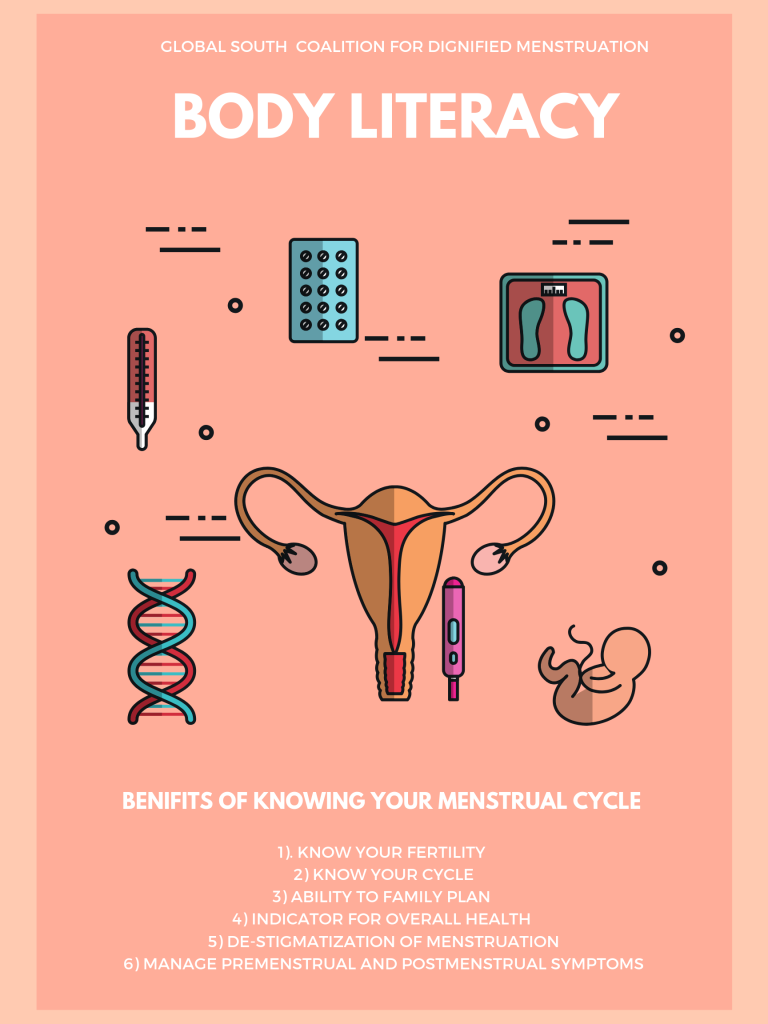
Know your cycle, understand your cycle, use your cycle.
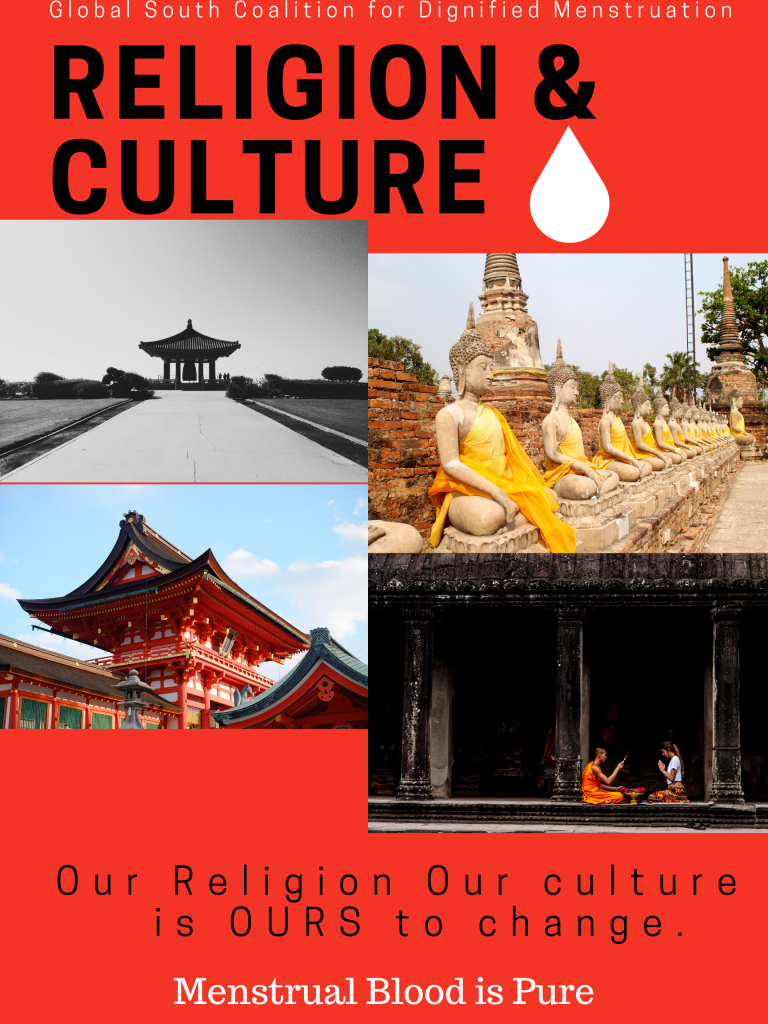
“This is tradition” “This is our sanskar” “This just IS” Thousands of multiple versions of these sayings are used as justification for menstrual restrictions in every corner of this globe. Blatant oppressive tactics are hidden behind culture and religion and used as a proxy to continue to discriminate and oppressed individuals who menstruate. This is used by all players in society: outsiders ( individuals who do not menstruate), the menstruating individuals themselves, and society in large to justify the maintenance of this inequitable structure. Using this fear-based psychological tactic, it is easy for individuals who bleed to internalize discriminatory values around menstruation such as impurity of menstrual blood so that they police themselves and others in the process of “ upholding culture”; as well as easy for individuals who do not menstruate to police and regulate individuals who bleed in order to ensure that they are following restrictions so that the culture is upheld by every single individual no matter the detrimental physical, mental, emotional, and spiritual cost to individuals who bleed. However, dignity during menstruation is an inalienable birthright that every single HUMAN BEING deserves regardless of their birthplace. Our religion is OURS to change, Our Culture is OURS to change to one that is equal, to one that does NOT discriminate against menstruation.
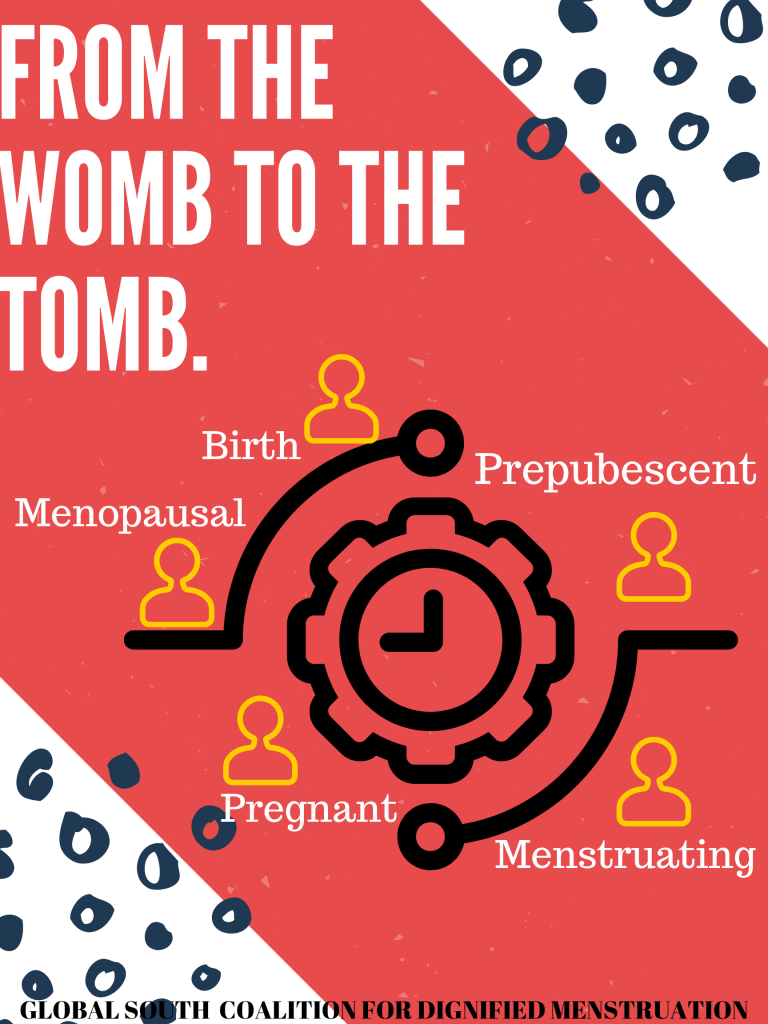
The consequences of discrimination against menstruation, the negative social value assigned to menstruation and menstruating people is not limited to when an individual begins to menstruate and when they enter menopause, stop bleeding.
Rather, it is a never ending cycle that begins with birth, experienced through its impact on gender roles due to menstruating feature, observed through discriminating practices in play through family or friends in prepubescent period, then experienced personally during menstruation period ( majority of life), changed in their perimenopausal period and then finally in menopausal period until death.
At every stage of the cycle, there is discrimination, stigma, taboo, and harmful practices which result in negative social, physical, mental, and emotional state of every menstruating individual which impacts their everyday life and their ability live full and fulfilled lives.
Menstruation is not a byproduct of life, it is the center, the beginning and the ending which unless seriously and critically mitigated to eliminate discrimination, center dignity, conduct intensive research on and learn of, will continue to adversely impact every individual, globally.
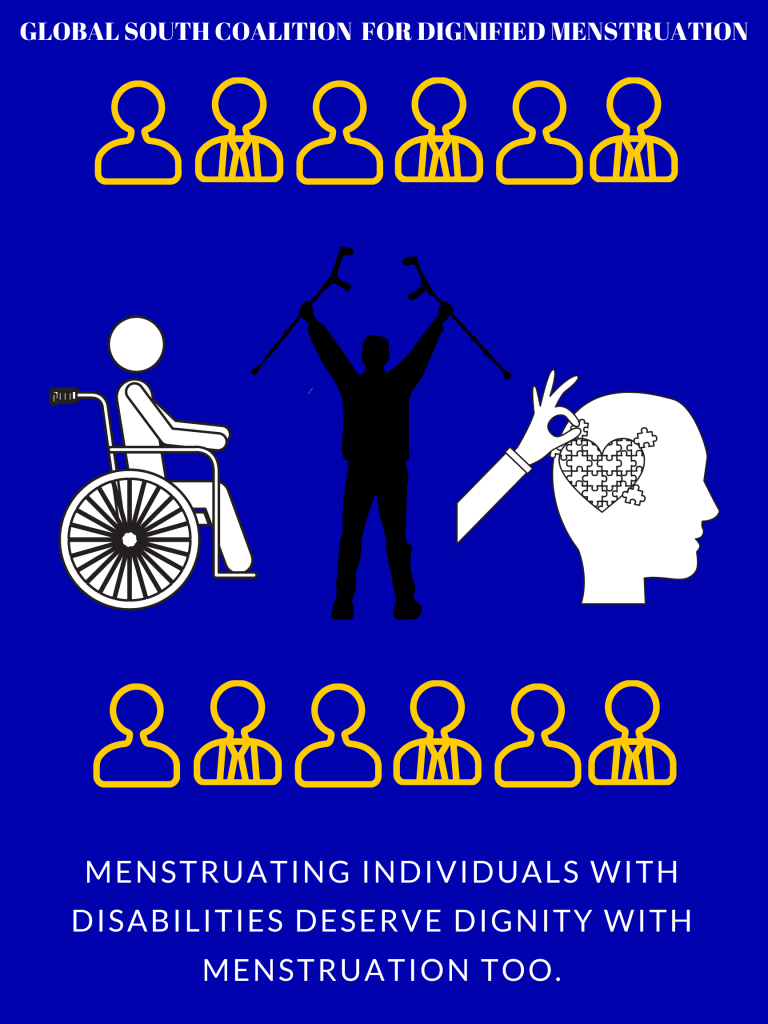
Within the vulnerable population of menstruating individuals impacted by discrimination against menstruation, individuals who menstruate and have a physical, mental, or emotional disabilities are further marginalized and susceptible to extreme adverse consequences of discrimination compared to able-bodied individuals due to social stigma, shame, oppressive policies, legislation, and general discrimination against disability.
It is essential to prioritize the needs of sub-marginalized groups within the vulnerable population of individuals who menstruate as their intersectionality of identities further puts individuals at risk of oppression and discriminatory behaviors. Individuals with disabilities may have physical, or mental difficulties to obtain or use menstrual products, voice their needs during menstruation and lack of bodily autonomy which is aggravated by social discrimination against menstruation and its implications.
It is critical to advocate for, and be an ally to individuals with disabilities and fight for their right to dignity during menstruation; there can be no success without the complete liberation of ALL bodies.
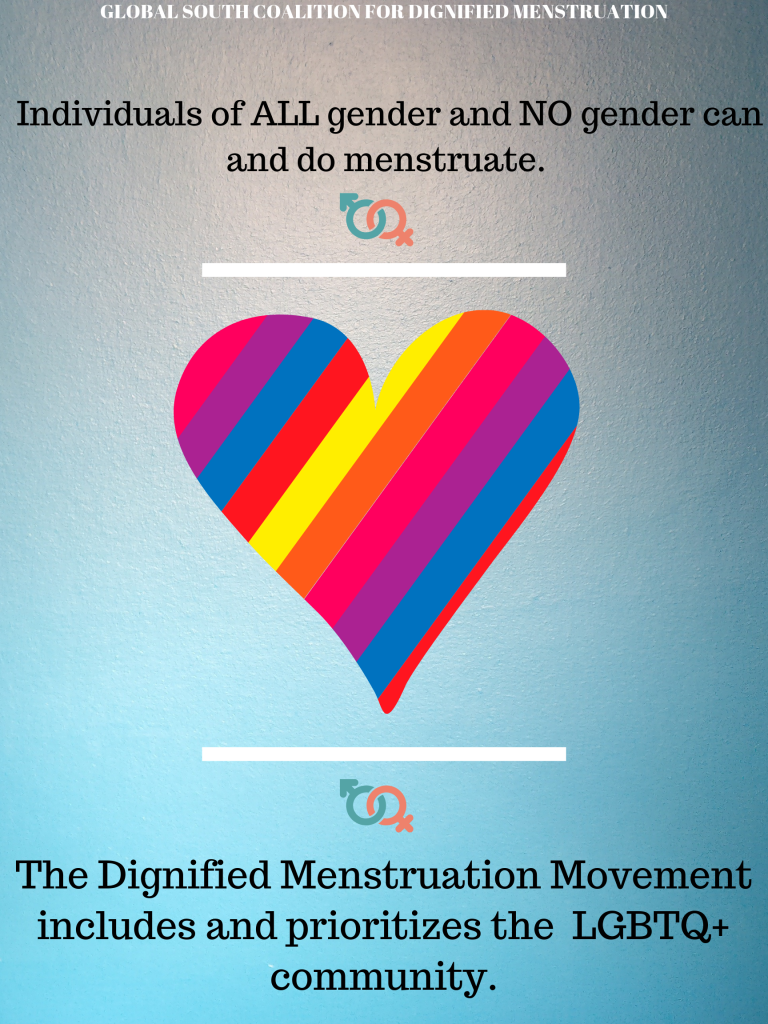
The Dignified Menstruation movement is not limited to individuals who identify as Women and Girls who menstruate but to ALL individuals who menstruate regardless of their gender identity.
Approximately 26% of the globe is actively menstruating and of “reproductive age”, while an underestimate of 10% of the globe is actively identifying as LGBTQ+.(UNICEF). Thus, without the inclusion of LGBTQ_ individuals rights and dignity, it is impossible to achieve dignified menstruation for all.
LGBTQ+ individuals are another sub-marginalized community within the menstruating community due to their intersectionality of gender identity and sexuality. LGBTQ+ individuals are discriminated in private, public, and through the institution; increasing their risk of physical, emotional, and mental violence. Transgender individuals are further marginalized due to their gender non-conforming identified which can often conflict with their ability to menstruate or not.
It is vital for the menstruation movement to be inclusive in various ways like:
A) In their use of language:
“Individuals who menstruate” vs Women and Girls; “Pregnant people” vs pregnant women
“ Reproductive rights and justice” vs Women’s rights
B) Inclusion of trans women and men and non-gender binary folks in menstrual studies, discussions, and open forum
C) sectors of the movement should be led by LGBTQ+ individuals.
D) Special considerations for extra protection of LGBTQ+ rights in the dignified menstruation and overall reproductive justice framework.
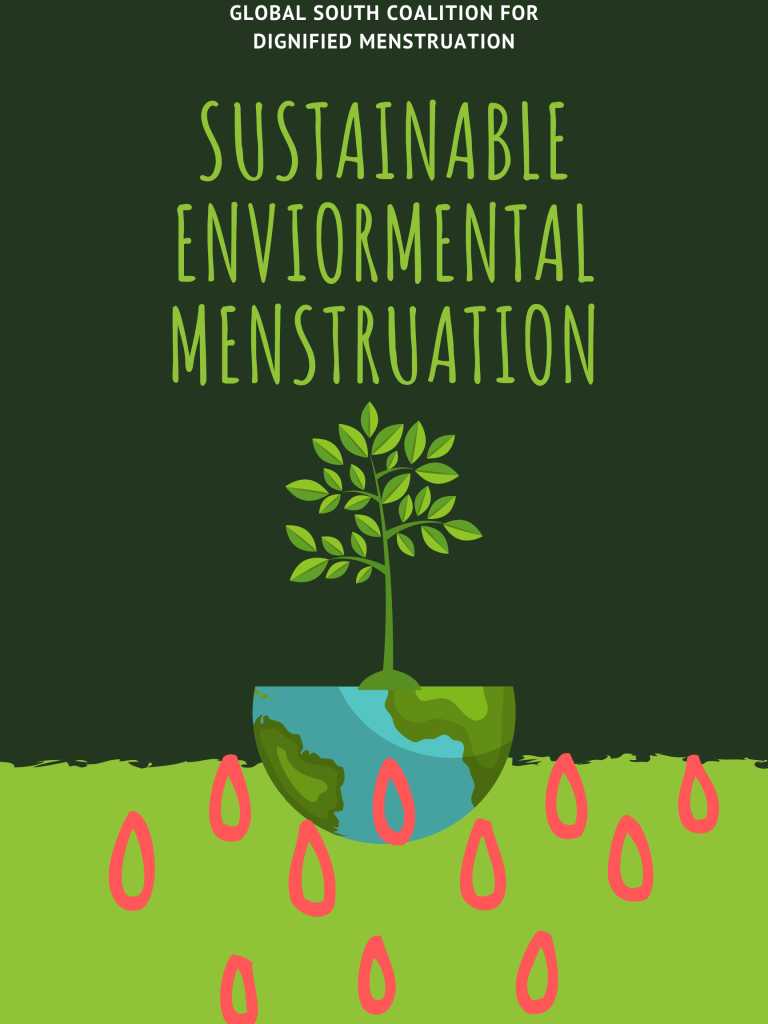
Menstruation & the Environment
It takes approximately 500 – 800 years for sanitary napkins to decompose in landfills (Down to Earth).
This means that our waste is here LONG after we will be gone. Menstrual products are a necessity for hygiene, health, and dignity. It is critical that menstrual products are both affordable and environmentally sustainable. As the effects of climate change grow and we bear the consequences, it is vulnerable communities who have and will primarily face the most adverse consequences of climate change – this means individuals who menstruate.
It is imperative that the menstruation movement is an environmentally sustainable movement to mitigate climate change and its effects on the most vulnerable. Additionally, there are harmful chemicals in popular “ cheap” menstrual products which are both harmful to the user and the environment.
One personal favorite to significantly reduce chemicals, economic, and environmentally sustainable is the menstrual cup. Although the initial purchase of a menstrual cup can be relatively more expensive than menstrual pads or tampons, it is reusable, biodegradable (varies), and free of toxic chemicals.
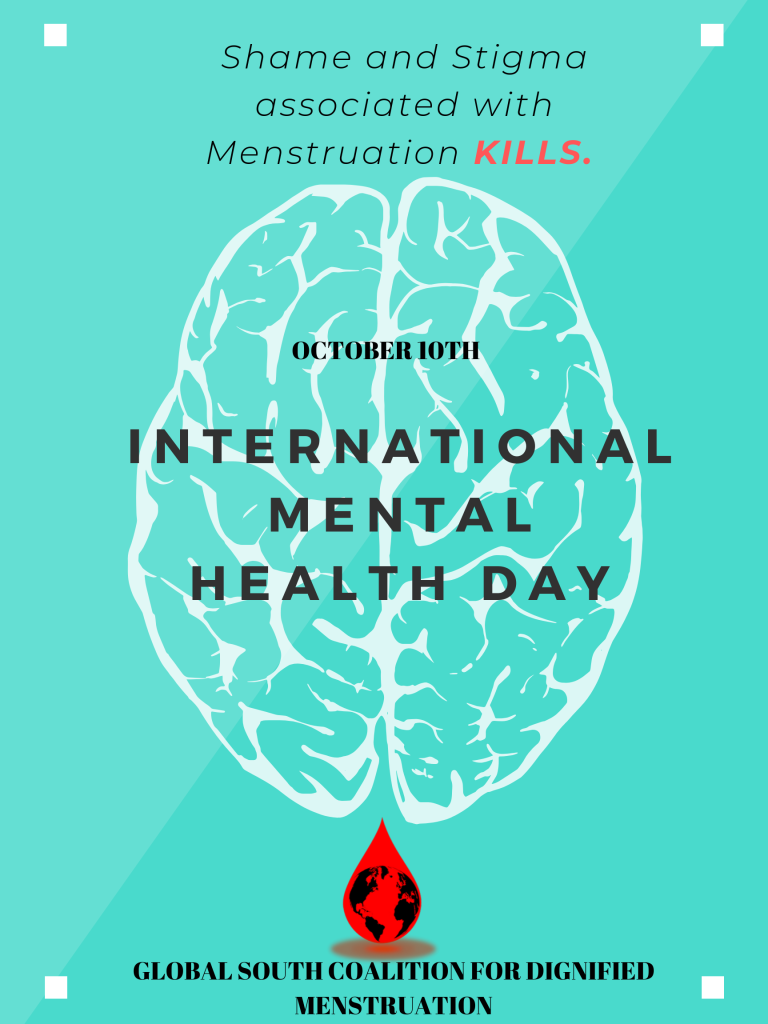
The Insidious reach of discrimination against menstruation is so extensive that it is almost unimaginable. Like a spider with eight legs, the evil, negative value given to menstruation and the individuals who menstruate reach into all the different aspects of one’s life, from one leg in the physical body, one in the social value, and one in the mental and emotional value. These all contribute to ones inherent value of self and how the society views themselves.
In early-mid September, A innocent young girl ( name unknown) in Kenya lost her life due to the many legs of menstrual discrimination and its impact on her inherent value to herself and to society. She killed herself after she was shamed and mentally /emotionally harassed by her school teacher, called “dirty”, after getting her first menses during school and physically isolated from her learning environment due to soiling her clothes with blood.
This was a tragedy. But more than that it was murder. Murder by the teacher who has internalized the discriminatory principles of menstruation, who has subjected her student to shame and isolated her to ‘teach” her that she is “dirty” because she is menstruating. Murder by the hands of a society that supports these ideals. At this young age of puberty, her mental state is forming and developing and at this critical stage of many changes in her body, she is subjected to shame, stigma, isolation ( physical or mental), this is what led to her murder.
It was a murder by the lack of dignity.
We fight on for #dignifiedmenstruation because it is not the simple lack of menstrual products or clean toilets or lack of hygienic practices that caused this murder. It is the result of the lack of dignity given to this young life that was just proceeding through a natural processes. It is the lack of dignity that kills thousands of lives just like this one.
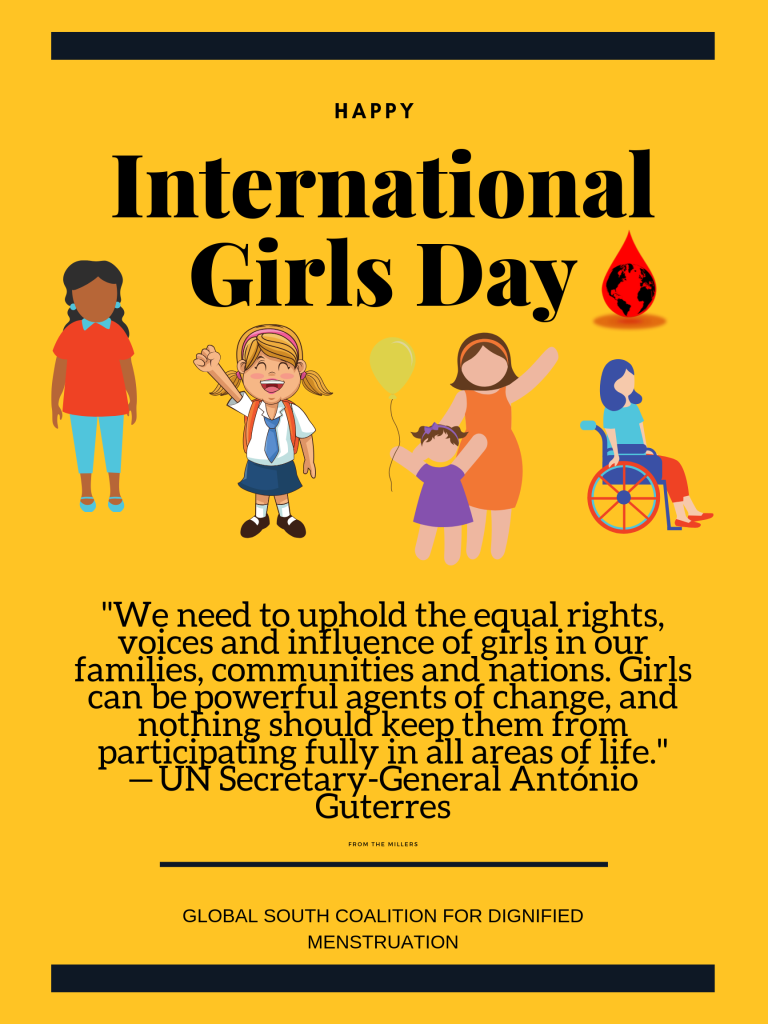
International Girls day, October 11th.
First and foremost, we must acknowledge that “girls” here, we define as cis-girls AND Trans-girls. Not every girl bleeds but elimination of discrimination against menstruation helps every girl.
To simply say we need to protect girls is an understatement. In this patriarchal system, where girls are individually and systematically oppressed in every sector of society from Gender-based violence, sexual harassment, unequal pay, low social value, domestic violence, violence specifically against trans-girls, menstrual discrimination and more, there is a critical need to not only protect our girls but to eliminate the very things they need protection from and empower to lift their voices and lives.
1. U.N. Report: 50,000 Women A Year Are Killed By Intimate Partners, Family Members. these figures are a gross underestimate due to the nature of data collection through self-reporting globally. (UNODC 2018)
2. This is mostly from Men – husbands, and family members participating in honor killings.
3. There is unfortunately little to no data on hate crimes for trans-women.
4. 12 Black trans women have been violently killed in USA in 2019 alone
5. Since January 2013, HRC has documented at least 128 transgender people who were victims of fatal violence; at least 110 were transgender people of color. Nearly nine in every 10 victims were transgender women and 45 percent of all domestic deaths occurred in the U.S. South. (HRC)
These numbers are real and this hate, violence is constructed and real against girls, and while not all girls menstruate, without eliminating discrimination against menstruation, the only physical indicator used as a proxy for “girls” and the idea of a “girls” as a gender construct, it is impossible to mitigate violence against girls. Without holding folks with power accountable like men and boys it will be impossible to achieve gender equity.
For girls that bleed, the first step is to provide dignity during menstruation, so that the very first distinction of their identity is not one full of shame, stigma, violence ( invisible and visible) but one full of power.
